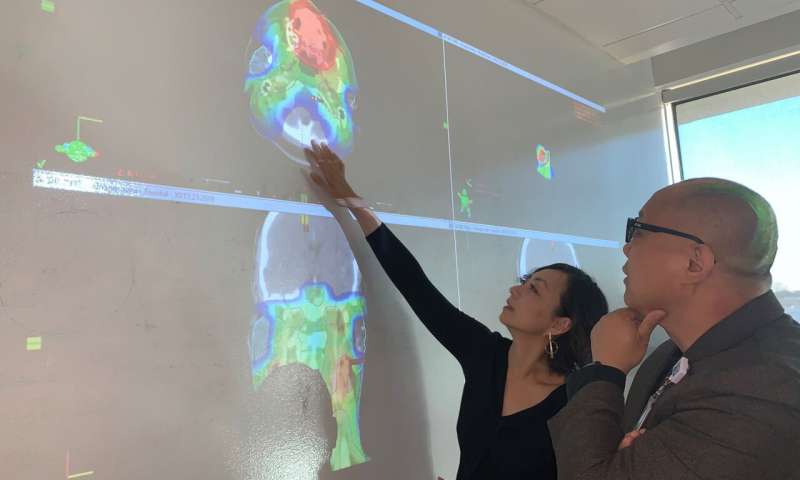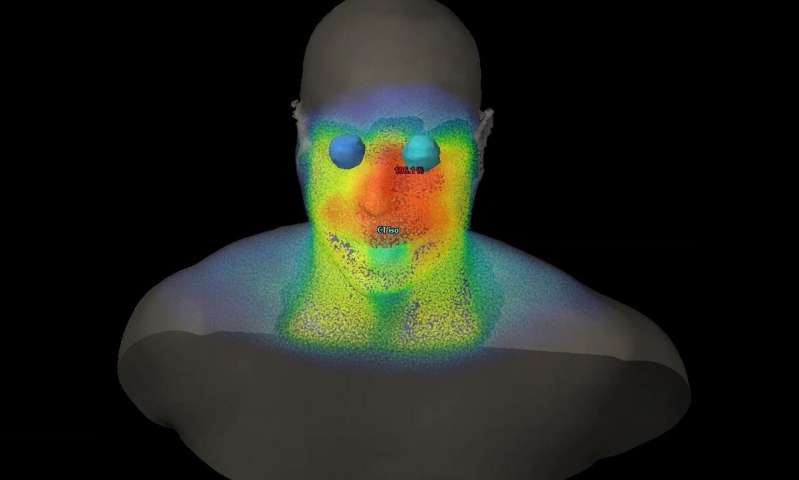Source: Thailand Medical News Jan 28, 2020 6 years, 4 weeks, 1 day, 13 hours, 54 minutes ago
AI or
artificial intelligence can help
cancer patients start their
radiation therapy sooner and thereby decrease the odds of the
cancer spreading or metastasizing by instantly translating complex clinical data into an optimal plan of attack.
Typically
cancer patients must wait several days to a week to begin
radiation therapy while doctors manually develop treatment plans. But new research from University Of Texas Southwestern shows how enhanced deep-learning models streamlined this process down to a fraction of a second.
 Dr. Mu-Han Lin, left, consults with Dr. Steve Jiang about a radiation treatment plan developed by
Dr. Mu-Han Lin, left, consults with Dr. Steve Jiang about a radiation treatment plan developed by
artificial intelligence. Dr. Jiang's team trained four deep-learning models to instantly generate
dosage plans and shorten the time patients must wait before starting radiation therapy. Credit: UTSW
Dr Steve Jiang, Ph.D., who directs University Of Texas Southwestern's
Medical Artificial Intelligence and Automation (MAIA) Lab told
Thailand Medical News, "Some of these patients need
radiation therapy immediately, but doctors often have to tell them to go home and wait. Achieving optimal treatment plans in near real time is important and part of our broader mission to use
AI to improve all aspects of
cancer care."
Oncology
radiation therapy is a common form of
cancer treatment that utilizes high radiation beams to destroy
cancer cells and shrink tumors. Previous research shows that delaying this therapy by even a week can increase the chance of some
cancers either recurring or spreading by 12-14 percent.
It was such statistics motivated Dr Jiang's team to explore methods of using
AI to improve multiple facets of
radiation therapy, from the initial dosage plans required before the treatment can begin to the dose recalculations that occur as the plan progresses.
Dr Jiang says developing a sophisticated treatment plan can be a time-consuming and tedious process that involves careful review of the patient's imaging data and several phases of feedback within the medical team.
 Scientists trained artificial intelligence to in
stantly generate 3D renderings of how best to distribute
Scientists trained artificial intelligence to in
stantly generate 3D renderings of how best to distribute
radiation therapy to cancer patients. The technology could allow patients to start treatment sooner,
thereby decreasing the odds of the cancer spreading. Credit: UTSW
A recent study from the MAIA Lab on dose prediction, published in
Medical Physics, demonstrated
AI's ability to produce optimal treatment plans within five-hundredths of a second after receiving clinical data for patients.
The medical and tech researchers achieved this by feeding the data for 70 prostate
cancer patients into four deep-learning models. Through repetition, the
AI learned to develop 3-D renderings of how best to distribute the radiation in each patient. Each model accurately predicted the treatment plans developed by the medical team.
The research study builds upon other MAIA research published in 2019 that focused on developing treatment plans for lung and head and neck
cancer.
Dr Jiang added, "Our
AI can cut out much of the back and forth that happens between the doctor and the dosage planner. This improves the efficiency dramatically."
Another new study by Dr Jiang, also published in
Medical Physics, shows how
AI can quickly and accurately recalculate dosages before each radiation session, taking into account how the patient's anatomy may have changed since the last therapy. A conventional, accurate recalculation sometimes requires patients to wait 10 minutes or more, in addition to the time needed to conduct anatomy imaging before each session.
Dr Jiang's researchers developed an
AI algorithm that combined two conventional models that had been used for dose calculation: a simple, fast model that lacked accuracy and a complex one that was accurate but required a much longer time, often about a half-hour.
The recently developed
AI assessed the differences between the models, based on data from 70 prostate
cancer patients and learned how to utilize both speed and accuracy to generate calculations within one second.
University Of Texas Southwestern plans to use the new
AI capabilities in clinical care after implementing a patient interface. Meanwhile, the MAIA Lab is developing deep-learning tools for several other purposes, including enhanced medical imaging and image processing, automated medical procedures, and improved disease diagnosis and treatment outcome prediction.
Reference: Dan Nguyen et al. Incorporating human and learned domain knowledge into training deep neural networks: A differentiable dose‐volume histogram and adversarial inspired framework for generating Pareto optimal dose distributions in radiation therapy, Medical Physics (2019). DOI: 10.1002/mp.13955

